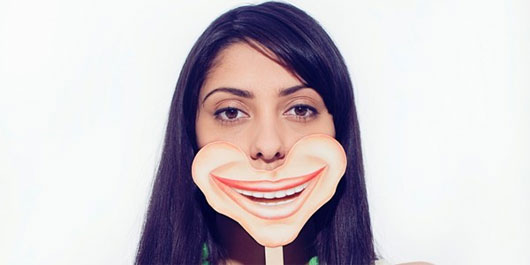The brain detects real smile - fake laugh of others
Recent research has shown, the human brain is capable of distinguishing natural smiles and "artificial" smiles .
Recent research by scientists at the Royal College London Holloway (UK) affirmed that the human brain is capable of distinguishing natural smiles when happy and 'artificial' smiles to please all people around.
Normally, when feeling interesting and real humor, the smile emitted by the opposite person's brain, activates the brain region in charge of happy and happy emotions.
However, when we come across a humorous situation but others pretend to be amused, the part of the brain that decodes emotions will be activated. This means that the brain realizes that this is not a real smile and will find out why the other person has to 'play' , what the real thoughts in their mind are.
To test the hypothesis, psychologist Carolyn McGettigan measured the response from the volunteers' brains as they watched clips of 'real laughs ' on Youtube.
Specifically, each participant is asked to choose clips that they feel funny and interesting. After that, the results will be compared to the brain's response to the 'artificial' smile. Volunteers are completely unaware of the purpose of being aware of 'real' smiles with 'artificial' smiles .

True smiles and pretending to laugh cause different effects on the brain
As a result of the comparison, people are able to clearly distinguish between real and unconscious smiles. More specifically, Dr. McGettigan said, the brain is able to identify whether the opposite person is truly happy.
According to research results, when volunteers witness a 'pretending' smile, the brain will activate the area to decipher the status and purpose of the opposite person, to understand the real reason behind the bud. laugh
This study helps explain why people can easily detect other people pretending to laugh. Previously, a study from University of Tübingen (Germany) also focused on this topic.
Research director Dr. Dirk Wildgruber discovered that our brains are very sensitive in distinguishing different groups of smiles, for example laughing for joy, or merely for mocking .
- How to know the person opposite you is making a fake smile?
- Hearing laughter makes us want to laugh, why is that?
- Laughing is sometimes not as good as we think
- Just laugh is the refrigerator itself
- The mystery behind the perfect smile
- Laughing is also a sign of frustration
- Tips to distinguish wine, real beer - fake when used
- How to distinguish real milk and very good fake milk
- Instructions on how to distinguish the most real and fake cosmetics
- How to recognize real honey, fake honey
- How to recognize fake beef with just one sheet of paper, everyone can do it
- Science points out the mystery behind the smile
 'Fine laughs' - Scary and painful torture in ancient times
'Fine laughs' - Scary and painful torture in ancient times The sequence of numbers 142857 of the Egyptian pyramids is known as the strangest number in the world - Why?
The sequence of numbers 142857 of the Egyptian pyramids is known as the strangest number in the world - Why? History of the iron
History of the iron What is alum?
What is alum?